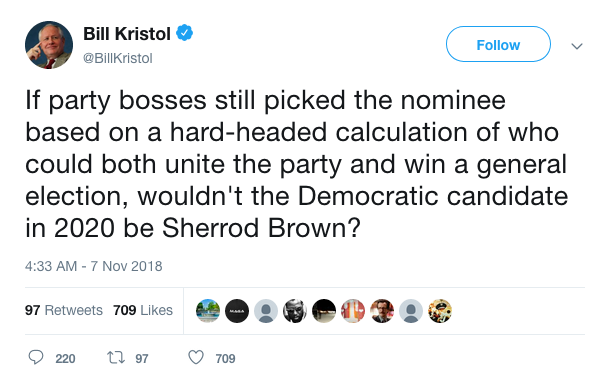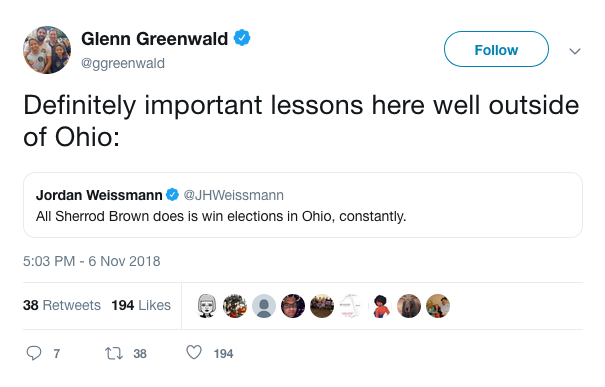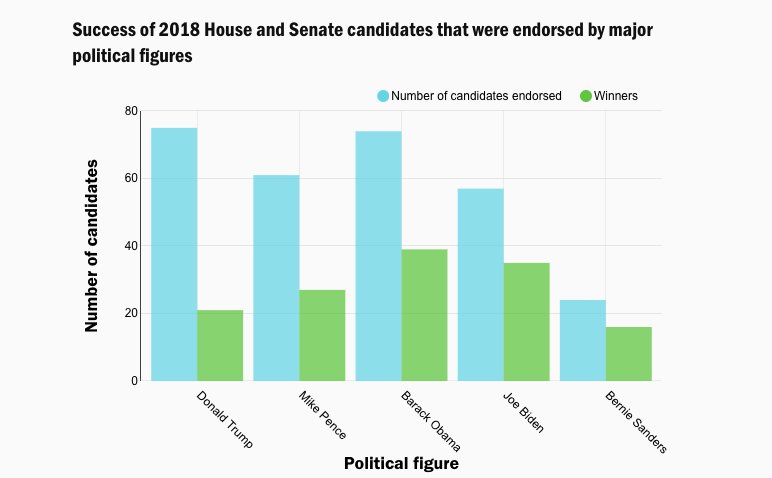Sherrod Brown
Published at 10:00 on 10 November 2018
First let’s start with two tweets, one from a conservative, the other from a progressive:


This is initially what caught my attention. One almost never sees such agreement. If a Never Trump conservative offers unsolicited advice to the Democrats, it is virtually always of the “concern troll” variety, reminding the Democrats that they must triangulate rightward to be politically viable. And, of course, those of us on the left advise the Democrats to move leftward.
Of course we both do. If you are an activist, of whatever stripe, you want the world to move in your direction. There’s nothing inherently wrong with this; in fact, a huge amount of human progress has happened because of activists and revolutionaries trying to move (and eventually succeeding at moving) society in a new and better direction.
What one must be careful of, however, is letting ones own goals and emotions get in the way of being able to see the world in a factual and objective manner. Strategies based on self-delusion almost never turn out well. As Bertrand Russell once observed: “Be scrupulously truthful, even if the truth is inconvenient, for it is more inconvenient when you try to conceal it.”
Sherrod Brown, for those unaware, is the Democratic two-term (soon to be three-term) senior senator from Ohio. Earlier this week he easily won reelection, despite being from a state that:
- Voted for Trump in 2016,
- Has elected (and reelected) a Republican for its other Senate seat,
- Has had a Republican governor for many years,
- Just elected a brand new Republican governor after its existing one got term-limited out of office, and
- Also just elected Republicans to the statewide offices of Auditor, Secretary of State, Attorney General, and Treasurer.
In other words, all Ohio statewide races, other than the one Brown ran in, this year were won by Republicans.
By pretty much all measures I’ve managed to take, he’s on the left of his party. He opposed corporate globalization during the Clinton Era, and he’s continued to oppose trade deals that shaft the working class. He opposed the repeal of the Glass-Steagall Act. He opposed the Iraq War. He’s stuck his neck out in support of LGBT rights (he opposed the Defense of Marriage Act in 1996).
Some months ago, I claimed here that Sanders could have won the 2016 presidential election. I based that claim, not on the assertion that the majority of American voters are leftists, but on the assertion that a huge swath of them are not centrists but rather nonideological pragmatists who are open to persuasion from a broad swath of the political spectrum.
And lo, it turns out that the most successful endorser of candidates this election cycle was none other than Bernie Sanders! A larger fraction of Sanders-endorsed candidates went on to victory than those endorsed by other celebrity politicians. The trick is selling your ideas to the nonideological pragmatists.
So, Brown’s success is no surprise. (Neither is Jeremy Corbyn’s popularity in the UK, which came as a complete shock to the chattering classes.) Leftist policies can be sold to the masses provided they are marketed in the right way. Messaging matters a lot.
Most people’s votes are primarily motivated by emotions, not rational analysis. (If it was the latter, not just left-of-center but radical-left politics would already have prevailed pretty much worldwide.) Fans of reason and logic (myself amongst them) might find that frustrating, but that’s just the way the world is. To prevail and actually have a chance of changing the world, we must prevail in the ugly, imperfect world that actually is—not in some hypothetical alternate world that might possibly some day exist.
Appeal to people’s emotions in the right way, and you have a fair shake at persuading them. Rub them the wrong way and it matters not how solid your logic is nor how firmly grounded in facts you are: you will lose.
Summing things up so far, Brown’s success is no surprise to me, and neither is Greenwald’s endorsement of Brown. What is a surprise is Bill Kristol’s endorsement. It comes not from some nonideological pragmatist but from a lifelong movement conservative, someone whose own emotions are strongly biased towards counseling the Democrats to run rightward.
That latter fact is, I think, highly significant. In Sherrod Brown, evidence seems to indicate we have an individual who is not only by any objective measure on the left of his party (and thus at the left of what is presently achievable via electoral politics), but also someone uniquely well-talented in the art of marketing himself politically. So well talented that he’s apparently managed to persuade not just many nonideological pragmatists, but an ideological adversary.
None of this means that a Brown presidency would make Establishment politics stop being Establishment politics. Of course it wouldn’t; revolutionary politics is still important. It’s just that there isn’t really much of the latter in the USA at the moment—and what there is, is more an inward-looking subculture than a movement. Trumpism needs to be dethroned as soon as possible, using whatever means are presently up to the task. Like it or not, that probably means replacing Trump with a Democrat via the mechanism of electoral politics.
Brown should be encouraged to run for president. If he chooses to run, the Democrats would be the biggest fools in the history of American politics if they didn’t run him against Trump.

